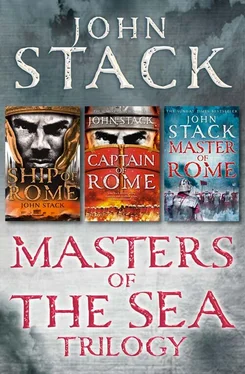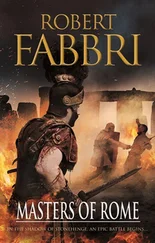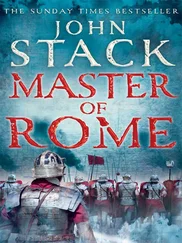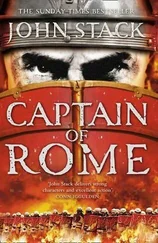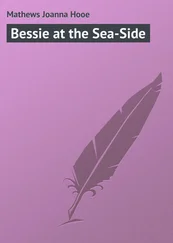1 ...6 7 8 10 11 12 ...20 The Carthaginian war cries reached a new high as another lunge was made in an effort to break the Roman line of battle. The sound spurred on Atticus and Lucius and sweat streamed from their bodies as they redoubled their efforts to sever the tiller from the rudder. The weathered toughened timber was as hard as iron, but with each axe blow small chips flew away and already they were halfway through the four-inch-diameter section.
On the main deck, Septimus saw a breach developing and immediately fed his best fighters into the gap. Within the space of two vicious minutes the gap was sealed once more and the tide of Carthaginians checked. The last of the reserves were now engaged. The next breach could not be held. If the Carthaginians broke through, the fight would become chaotic and all chance of a withdrawal would be lost.
The tiller finally parted under the blows of Atticus and Lucius. Now, even if the Carthaginian galley managed to get back under way, the loss of her rudder would render her useless.
‘Septimus!’ Atticus roared. ‘Withdraw!’
Septimus heard the signal. ‘Fighting withdrawal!’ he roared, his men instantly stepping back towards the aft-deck.
The sudden break-off in resistance threw the Carthaginian attack and a gap opened between the lines.
The twenty triarii who had remained on the Aquila now loosed volleys of spears into the flank of the Carthaginian forces, checking their advance, allowing the marines vital seconds to mount the aft-deck rails and recross onto the Aquila . Within moments the bulk of the marines were aboard, with just a small knot remaining, Septimus amongst them. Under an almost constant volley of spears, the Carthaginians reared up in attack again, their centre driven by a demonic commander, rage emanating from his frame as he tried to cut off the remaining marines. The lines of the grappling hooks were severed as Septimus jumped across the opening gap, the last man to do so.
Gisco could only look on in futile rage as the Roman galley re-engaged her oars, hastening her escape. The Carthaginian fleet was still two thousand yards away, too far behind to stop the Romans reaching the mouth of the strait. All around him his men stood at the side rail of the aft-deck, shouting defiance and insults of cowardice at the Romans. Gisco remained silent, his eyes searching the rails of the enemy ship. The two men he sought were on the foredeck, standing side by side, the taller man, the marine centurion, recognizable from the fight. They were the commanders and he instantly saw they were watching him intently. Gisco burned the images of their faces into his mind. As the gap opened to one hundred yards the Roman galley began to come about to resume her course northwards.
‘ Aquila ,’ Gisco read on the stern of the galley.
Gisco made a silent promise to the gods that one day he would hunt down that ship and have his revenge on all who sailed on her.
The sail billowed out with a crack as the trailing wind filled the broad canvas sheet, the running rigging straining against the pull. Within an instant the Aquila was propelled to fifteen knots, its cutwater tearing through the sea, throwing a spray of water across the foredeck. The running of a galley required immense skill and concentration, and Atticus noticed the iron look on Gaius’s face as he fought to keep the helm true. One slip and the galley’s stern would swing through the line of the wind. The sail would be exposed to unequal stresses, instantly snapping the rigging and collapsing the canvas. Worse still, if the rigging held, the galley would capsize under the press of wind.
Atticus watched in silence as the experienced helmsman struck a delicate balance between the prevailing wind and the ship, making the two connect until the galley perfectly matched the wind’s speed and direction. Confident that Gaius had the ship in hand, Atticus looked out over the stern rail to confirm the Carthaginians were not in pursuit. The Aquila was now four hundred yards clear of the headland at the northeastern tip of Sicily. The Punici had not followed beyond the strait.
Atticus was in turmoil as he realized his ship had escaped. Although he had known the only choice had been to flee from the enemy fleet, the retreat from the Carthaginian galley marked the first time in his whole life that he had run from an enemy. The empty sea behind the Aquila mocked the captain for its absence of an enemy and Atticus slammed his fist onto the stern rail. Knowing he had made the right decision was not enough to assuage the dishonour he felt at having fled.
Septimus stood silently by Atticus’s side. Eight marines were unaccounted for from the fight on board the enemy galley, six of them hastati , junior soldiers, many of them in their first battle. He could only pray that all had died under the sword and that none had been left injured on the enemy’s deck. If taken alive their fate would be horrific. The Aquila had been saved because of the sacrifice of those men. Septimus recounted their names silently in his mind.
‘Where are we sailing to?’ he asked finally.
‘To the only port Rome holds on the north coast. To Brolium.’
Septimus nodded, looking ahead over the bow. During his time on the Aquila he had come to accept that the unfamiliar seas around him held many enemies, as had the unfamiliar terrain of Sicily when he had served in the legions. As a legionary he was always confident that he served in the best land army in the world. The sight of the Carthaginian fleet had made him realize that Rome did not enjoy that same superiority and confidence at sea.
Eight hours later the Aquila rounded the eastern headland guarding the approaches to the Roman-held port of Brolium. Atticus stood alone on the bow, preferring solitude as the hours had sped past and league after league fell under the galley’s wake. His thoughts had ranged over every detail of the Carthaginian ships they had fought, every difference, however minute, between them and the vessel under his feet, his mind slowly forming a model of the heavier, stronger galleys that would soon plague the waters off northern Sicily.
A sudden change in the tilt of the deck broke Atticus’s thoughts as Gaius lined up the Aquila to strike the very centre of the hectic waters ahead, crammed with transport barges awaiting a chance to disgorge their contents onto the already crowded docks of the once-quiet fishing town. Even from this distance out, the air around Atticus was filled with the hum of voices from the multitude at work, broken occasionally by the sound of a whip crack as a driver spurred his team of oxen to advance, signalling the departure of yet another fully loaded wagon along the road south to the fortified legion encampment hidden beyond the town.
The scene of docking and departing barges, of unloading and reloading supplies, of man and beast struggling for space on the congested docks seemed completely chaotic, and yet Atticus could sense the underlying order that permeated the entire operation as no voice was raised in anger and everywhere men moved with purpose and intent. The Roman legions had never fought a campaign off the mainland before Sicily, and yet, within a matter of months, the Romans’ ability to bring order and discipline to all endeavours ensured that the legions were operating as if they were but a mile from the city of Rome itself. Atticus could only wonder if any natural barrier would ever exist that could protect a people against the seemingly relentless advance of Rome.
Lucius’s sharp commands cut through the cacophony as the sail was collapsed and made secure and the oars were engaged in the rapidly dwindling sea room of the inner harbour. Again Gaius’s incredible skill was called upon as barge after barge was avoided, their crews shouting warnings and curses as each near collision with the slow, ponderous vessels was averted. Atticus’s gaze swept the dock, searching for an opportunity. He quickly saw one and calculated the angles. It would be tight.
Читать дальше
